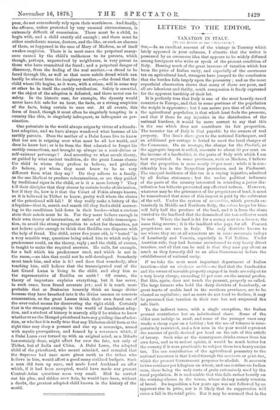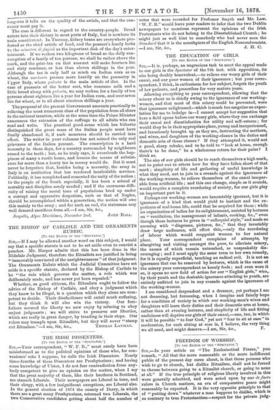LETTERS TO THE EDITOR.
TAXATION IN ITALY.
[TO TUE EDITOR OF TILE "SPECTATOR:.] Sun,—In an excellent account of the vintage in Tuscany which lately appeared in your columns, I observe that the writer is possessed by an erroneous idea that appears to be widely diffused among foreigners who write or speak of the present condition of Italy. Hearing much of the great increase of taxation which has been the price of Italian unity, and especially of the enormous tax on agricultural land, strangers have jumped to the conclusion that the burden falls largely upon the peasantry ; and as the most superficial observation shows that many of these are poor, and all are laborious and thrifty, much compassion is freely expressed for the apparent hardship of their lot.
It is perfectly true that Italy is one of the most heavily-taxed countries in Europe, and that to some portions of the population the weight is oppressive ; but I can assure you that of all classes, the agricultural population is that which least feels the pressure, and that if there be any injustice in the distribution of the national burdens, it would be more correct to say that this is the one which does not contribute its fair proportion. The monster tax of Italy is that payable by the owners of real property. The lion's share goes to the national Exchequer, and an additional per-centage is levied to meet the local charges of the Commune. On an average, the charge for the Prediali, as the aggregate impost is called, amounts to about 30 per cent. on the income of a landholder, in the parts of Italy with which I am best acquainted. Iu some provinces, such as Modena, I believe that the proportion is more nearly -10 per cent ; while it is con- siderably less in the Neapolitan provinces, and in Piedmont. The unequal incidence of this tax is a crying injustice, admitted by all Italian statesmen ; but the undue political influence of the parts of the country interested in retarding a juster dis- tribution has hitherto prevented any effectual redress. However, whatever may be the grievances of the proprietors of land, it must be remembered that none of this impost is paid by the cultivator of the soil. Under the system of mezzadria, which prevails ex- tensively in Middle and Northern Italy, the colono keeps for him- self fully half the produce of the laud, and it is from the share carried to the landlord that the demands of the tax-collector must be met. Where the land is let for a money rent to a farmer, the same thing occurs ; it is the landlord who pays for all. Peasant. proprietors are rare in Italy. The only districts known to me where they are at all numerous are in some mountain valleys of Lombardy and Venetia, especially in Val Tellina. Under Austrian rule, they had become accustomed to very heavy direct taxation, and all that can be said is that they now pay about as much as they formerly did to an alien Government before the establishment of national unity.
If we take the next most important department of Italian taxation—that on rieekezta mobile—we find that the fuudholder and the owner of movable property engaged in trade are subject to a very heavy charge, exceeding 13 per cent. on the annual profits. But this, again, does not touch the peasant, properly so called. The large farmers who hold the dairy districts of Lombardy, or great tracts of arable land in the southern provinces, arc to be classed as capitalists ; and as rents do not tend to decline, it may be presumed that taxation in their case has not surpassed the safe limit.
To the indirect taxes, with a single exception, the Italian peasant contributes but an infinitesimal share. Some of the older men indulge in snuff, and some of the younger ones may smoke a cheap cigar on a holiday ; but the use of tobacco is com- paratively restricted, and a few sous in the year would represent the amount of profit derived per head on the sale of this article of luxury. Such wine as the countryman drinks comes from his own farm, and as to ardent spirits, it would be much better for the country if it were practicable to subject them to a heavy excise tax. The one contribution of the agricultural peasantry to the national resources is that levied through the macinato or grist-tax, which the present Government proposes to abolish. It amounts to two centimes per kilogram on wheat, and one centime on Indian corn, these being the only sorts of grain extensively used by the rural population. It is undeniable that this falls rather heavily on the working-classes in the towns, whose dietary mainly consists of bread. Its imposition a few years ago was not followed by an apparent rise in price, nor is it likely that its suppression will cause a fall in the retail price. But it may be assumed that in the long-run it tells on the quality of the article, and that the con- sumer must pay it.
The case is different in regard to the country-people. Bread enters into their dietary in most parts of Italy, but is nowhere its main constitutent. In Tuscany, kidney beans are everywhere pro- ferred as the chief article of food, and the peasant's family looks to the minestra di fa9ioli as the important dish of the day's enter- tainment. If we reckon two kilograms of bread as the daily con- sumption of a family of ten persons, we shall be rather above the mark, and the grist-tax on that amount will make fourteen lire and sixty centimes, or less than eleven shillings in the year. Although the tax is only half as much on Indian corn as on wheat, the macinato presses more heavily on the peasantry in Upper Italy, where polenta is the main article of diet. In the case of peasants of the better sort, who consume milk and a little bread along with polenta, we may reckon for a family of ten persons about eighteen lire a year for Indian corn, and over seven lire for wheat, or in all about nineteen shillings a year.
The proposal of the present Government amounts practically to relieving the most numerous class of the population from all share in the national taxation, while at the same time the Prime Minister announces the extension of the suffrage to all adults who can read and write. The practical good-sense which has hitherto distinguished the great mass of the Italian people must have finally abandoned it, if such measures should be carried into effect. The writer in your columns has not missed the only real grievance of the Italian peasant. The conscription is a hard necessity in these days, for a country surrounded by neighbours armed to the teeth ; but, as he truly says, it overclouds the hap- piness of many a rustic home, and lessens the means of subsist- ence far more than a heavy tax in money would do. But it must never be forgotten that, besides being a necessity, the army in Italy is an institution that has rendered incalculable services. Politically, it has completed and cemented the unity of the nation ; to the people of the South especially, it has been a school of morality and discipline sorely needed ; and if the enormous diffi- culty of raising the moral tone of populations bred up under a corrupt and oppressive despotism, such as that of Naples, should be accomplished within a generation, the nation will owe this mainly to the army ; and for such an end, the statesman may well demand sacrifices from all.—I am, Sir, 8:c., Sospello, Alpes Maritimes, November 2nd. JOHN BALL.



































 Previous page
Previous page